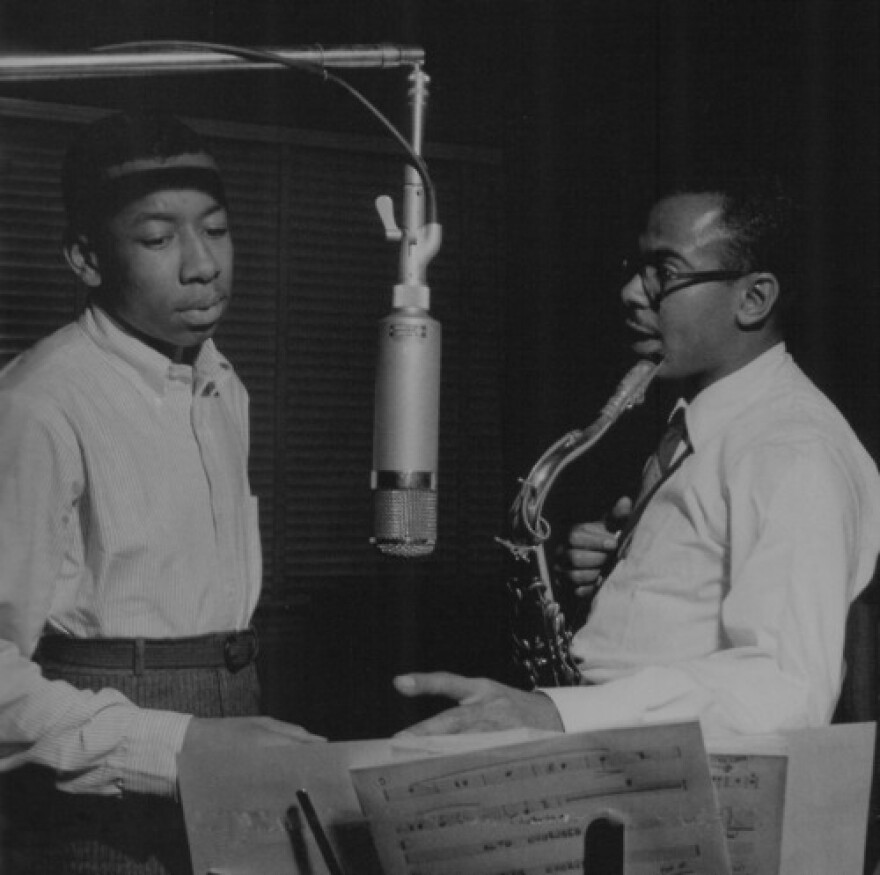Benny Golson’s Memorial to Brownie

[Ed. note: This post was originally published on October 30, 2015]
Benny Golson composed “I Remember Clifford” in memory of his “friend forever,” Clifford Brown. They’d been colleagues in Tadd Dameron’s orchestra in 1953 and had played together on Philadelphia’s thriving jazz scene in the early fifties. This best known of jazz elegies was premiered in January 1957, six months after Brownie’s tragic death in a car accident on the Pennsylvania Turnpike. At the time, Golson said, “I worked with this melody for three weeks, trying to get a melody that would be reminiscent of [Clifford] and the way he played…I was very moody while composing this song because with each note I wrote, I realized that it was to someone who had gone— my friend forever.”

Lee Morgan is seen here playing “I Remember Clifford” in a 1958 performance by Art Blakey and the Jazz Messengers. Golson harmonizes with Morgan on tenor saxophone. He and Lee, another Philadelphian, were front-line partners in one of the best known editions of the Messengers. Golson was with the group only for a few months, but the one album he made with them, Moanin’, assured that that edition of the Messengers would enjoy a hallowed status among the succession of bands led by Blakey. It was the drummer’s first Blue Note release in three years, and four of the album’s six tunes became jazz standards, including “Moanin’,” the gospel-infused title track by pianist Bobby Timmons, and Golson’s three originals “Are You Real,” “Along Came Betty,” and “Blues March.”https://www.youtube.com/embed/RM9Pe-9kmMo?enablejsapi=1
While Golson’s tenure with Blakey was brief, his association with Morgan was more extensive. They played together with Dizzy Gillespie’s orchestra, which the trumpeter joined in 1956 at the age of 18. (Golson was 27.) Immediately afterward, Morgan began the prolific recording activity that characterized, but for a period of inactivity in the early 60’s, his entire career. Lee’s first dates were made for Blue Note in 1956 and ’57, and while Golson didn’t appear with him until his fourth session, his compositions comprise the majority of pieces played by Morgan on his first three Blue Note dates.
Clifford Brown was killed on June 26, 1956. Golson’s threnody for the beloved Brownie was first recorded by Donald Byrd with Gigi Gryce and the Jazz Lab Band on January 13, 1957. Morgan was the next trumpeter to commit it to record on March 24, which was Golson’s first date with him. Dizzy Gillespie hailed Brownie as “the late genius of the trumpet” before playing “I Remember Clifford” at the Newport Jazz Festival on July 6, 1957. Subsequently released on Verve as Dizzy Gillespie at Newport, it stands as one of Gillespie’s most moving performances and a landmark in jazz history, not least for the hush it brought over the Newport crowd. Dinah Washington, who’d recorded with Brown and Roach in 1954, sang Jon Hendricks’s lyricized version of the memorial for Brownie, “a king uncrowned,” later that year. Since then, it’s been recorded over 300 times. A 1960 version by The Jazztet, the group co-founded by Golson and Art Farmer, is often cited as definitive for the lyrical beauty of Farmer’s trumpet playing.
In recent years, Roy Hargrove has played “I Remember Clifford” while on tour with Golson’s Sextet. His performances rank with the best of all time and support the view of Hargrove as a young man with old soul sensibilities. Footage has circulated of him playing it at JazzBaltica (though it’s not presently available), and Benny saying “Thank you, Roy,” with obvious conviction, at its conclusion.
In his closing comments, Golson mentions an earlier appearance he’d made at JazzBaltica with an array of special guests including Art Farmer, Toots Thielemans, Kenny Kirkland, Milt Jackson, and Max Roach. Jackson was the featured soloist on “I Remember Clifford” on that occasion. He’d first recorded the tune on Bags’ Opus, a 1958 session that also featured Golson and Farmer. Golson had conceived of the memorial as a vehicle for trumpet and was personally reluctant to solo on it for many years, but over time, like here on the German Baltic, he’s become one of its foremost interpreters.